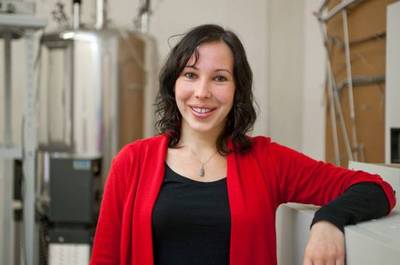Discovery could lead to greener ways of making drugs
Discoveries made during PhD studies by Victoria University graduate Emma Dangerfield could revolutionise the pharmaceutical industry by allowing drugs to be made in a more environmentally friendly way.

Dr Dangerfield’s formula allows drug molecules to be made in five to eight steps - around half the usual number. Instead of petrol, her system uses water and ethanol, delivering environmental benefits and cutting the costs involved in generating and disposing of waste. It also uses renewable raw materials that come from plants, such as trees, corn and rice husks.
Traditional methods of drug manufacture use toxic organic solvents and petrochemicals, a process that results in around 240,000 tonnes of potentially harmful waste having to be disposed of each year.
The work, which has been patented, is one of two strands of research into carbohydrates carried out by Dr Dangerfield as part of a joint project between Victoria University and the Malaghan Institute of Medical Research. Dr Dangerfield is being supervised by Malaghan’s Dr Bridget Stocker and Victoria’s Dr Mattie Timmer.
Dr Dangerfield discovered two new chemical reactions and, subsequently, developed a process that uses them to more quickly and efficiently make aza sugars - important molecules in the manufacture of drugs to treat diseases such as diabetes, cancer and viral infections like HIV.
“Rather than just using the technologies we’ve got, I’ve always believed we should be trying to find new, better ways of synthesising molecules,” she said.
After proving the viability of the system she developed, Dr Dangerfield went on to investigate how the technology performed in other drug development reactions, with promising results.
The green chemistry research Dr Dangerfield is involved with has been published in six international journals, including Organic Letters, and been cited in top-ranked publications such as Nature Chemistry.
Green chemistry is still in its infancy, but Dr Dangerfield says the subject is attracting a lot of international attention.
Solar cell achieves world record for efficiency
University of Queensland researchers have set a world record for solar cell efficiency with...
Boral secures grant for cement kiln carbon reduction
The project will reduce process emissions from cement clinker manufacturing by up to...
Vast secures grant to progress SA Solar Fuels project
HyFuel Solar Refinery, a subsidiary of Vast, has been awarded $700,000 through the ASLET...










